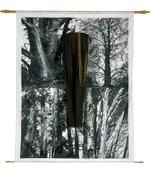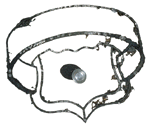| < |
3 |
|||||||||||||||||
| 2 | 3 | 4 | 5 | 6 | 7 | 8 | 9 | Jill Giegerich | . | |||||||||
M. Are you still looking at work?
No. Not very much. Other people's work you mean? No. I'll occasionally go look at work if it compels me the way I get my own idea and am compelled to make it. If it feels like it's something I'd really really like to see, but I don't have that experience very often. I read a lot. That's what I spend a lot of my time doing. And I don't know why that is. I'm not sure if I'm just getting to be like a cranky, older artist or if it's really that I just don't see very much interesting art. So it's like I was talking about the priority of energy. I really think a lot about my energy and where I'm going to put it.
Well, I still have some belief in art making. I mean it seems like a fairly benign activity. I suppose it can be used definitely for non-benign purposes, but I think that I still have a definite belief that the life of the mind is extremely important. I just don't see it very often in the world of the plastic arts. I just rarely, rarely ever see it there. But that's always been true. I don't think that's a new experience for me. When I think about when I first started going to art school, what compelled me when I started to really look at things, what compelled me to want to make art, none of it was plastic arts. It was films I'd seen and books I'd read. And why I made objects then I'm not exactly sure.
M. I think that's a good point. I think that's actually true of a lot of people our age. I've actually had this conversation with other people too, that the most influential thing to us at the time was movies. You know?
Yeah. Yeah, right.
M. And I, why the hell did we do this? It doesn't make sense.
 Well, I guess for me if I think about it, it's that at the time I couldn't imagine working with other people so I couldn't imagine making a film. And I didn't consider myself a talented writer. But I knew that I could make things. I knew that... I'd always made things. I knew that I could make things with my hands. So I think that it just kind of naturally happened. But it certainly wasn't because I was inspired by objects that I had seen. I can think of very few objects, some stuff by Joseph Beuys...
Well, I guess for me if I think about it, it's that at the time I couldn't imagine working with other people so I couldn't imagine making a film. And I didn't consider myself a talented writer. But I knew that I could make things. I knew that... I'd always made things. I knew that I could make things with my hands. So I think that it just kind of naturally happened. But it certainly wasn't because I was inspired by objects that I had seen. I can think of very few objects, some stuff by Joseph Beuys...
M. I bet you could.
I could think of a little more. I could... Duchamp.
M. I bet if you thought about how much...
Yeah, I could think of stuff. But if I run through all that stuff and I think of what really got to me, it's like "Kasper Hauser", seeing that film "Kasper Hauser". And listening to certain kinds of music. And reading certain things that just really got into me.
M. See, I think that I actually thought that I could kind of achieve the same kind of impact.
Yeah, I thought I could too.
M. And then was sort of surprised (that), well, why can't you stare at a painting for two hours? And I still insist that you can... Even if I have to be strapped in. (Both laugh) If I can sit through even a mediocre movie for an hour and a half, then I should be able to demand that of a painting. It may be an unreasonable demand, but so what?
Well, I think that the very least we hope for as artists is engagement. I mean whether that's stupid to want or not, I think it's a very honorable thing to want, to want to engage with another human being on some kind of meaningful level. But I think in this particular time that we're in, it's a lot to ask of a static object. There's just so much more seduction available. People are not trained to...
M. I don't know. I'm not sure what time has to do with it. A lot to ask of an object? I don't know why we have some kind of temporal pardon.
 Maybe time doesn't have to do with it, maybe spectacle has to do with it, because it is such a spectacle oriented culture. Though, I don't know, maybe that's not it either because I went to Indonesia a few years ago and that's a very spectacular culture. And the function of static objects was as compelling as anything else that was going on there. So maybe it's something more particular. All I know is I don't see a lot of static stuff that is very interesting to me. Maybe it's the particular interests that are being explored in a lot of work today. Maybe that's what it is. Maybe that is not particularly interesting to me.
Maybe time doesn't have to do with it, maybe spectacle has to do with it, because it is such a spectacle oriented culture. Though, I don't know, maybe that's not it either because I went to Indonesia a few years ago and that's a very spectacular culture. And the function of static objects was as compelling as anything else that was going on there. So maybe it's something more particular. All I know is I don't see a lot of static stuff that is very interesting to me. Maybe it's the particular interests that are being explored in a lot of work today. Maybe that's what it is. Maybe that is not particularly interesting to me.
M. Do you think that changes?
Yeah. Yeah, I do. But I'd say it hasn't changed a lot in my lifetime. I don't know how quickly it changes, but I think that the kind of self-referential, not self of the artist, but the reference back to the dilemmas of modernism, is something that I'm not altogether interested in anymore...
M. I think that you're understating it.
(Laughs) Trying to be kind. I've seen a lot of work that feels like it's biting its own tail. The circle is complete. It has no use for me. And consequently I have no use for it. And I feel like that's modernism's game, to a certain extent.
M. What would fall outside of that?
Probably endeavors that to someone involved in that kind of stuff, would sound hopelessly romantic. Like work that deals with human experience and human travail and isn't so cocksure all the time about its position, that invites a dialogue knowing that there's no answer to the question.

